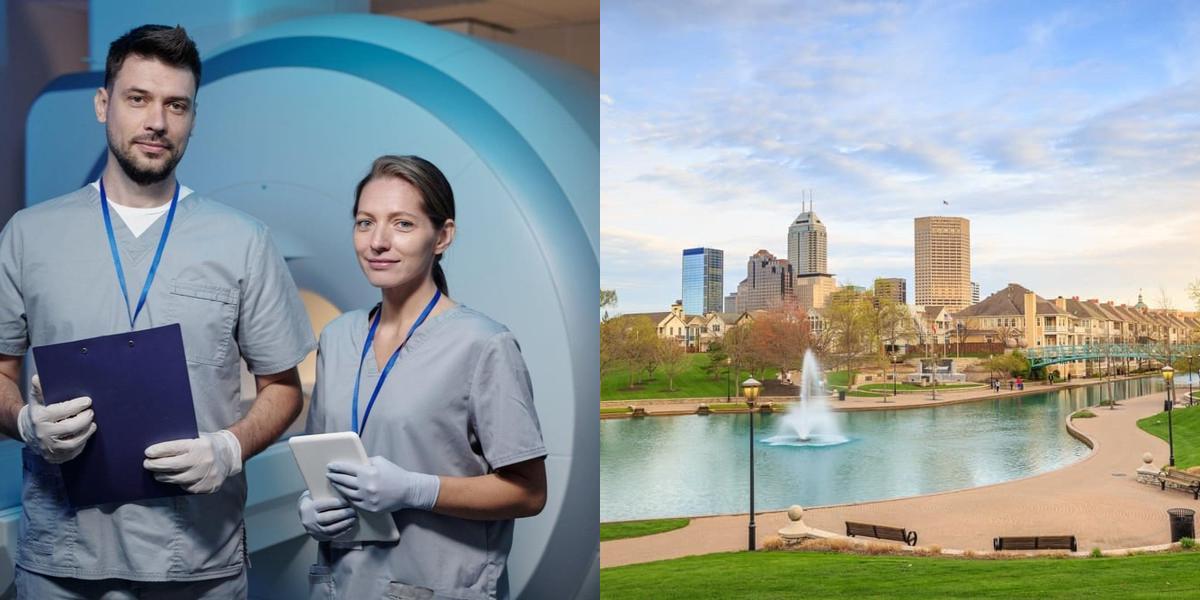How to Become a Radiology Technician in Indiana (2025)

If you want a career in Indiana's healthcare sector that blends technology with direct patient care, becoming a licensed Radiologic Technologist is a direct, two-year path to a stable, well-paying job. With over 5,400 technologists in the state earning a median salary of $71,500 annually, according to the U.S. Bureau of Labor Statistics, the field offers strong security and income. This guide provides the definitive 5-step process to navigate Indiana's mandatory training, certification, and licensing requirements.
How to Get a Radiology Technician Job in Indiana?
Create a professional resume that prominently features your Indiana license number and ARRT credentials. Detail your clinical rotation experience and any specialized modalities you trained on. Search for positions at major Indiana health systems like IU Health, Community Health Network, and Franciscan Health, as well as at outpatient imaging centers across the state.
5. Pursue Advanced Education
Your initial radiography license is a launching pad. To increase your salary and career options, you can pursue advanced certifications in specialized areas like MRI, CT, Mammography, or Interventional Radiology. Many of these require just a few months of additional training.
Where to Find Radiology Technician Classes in Indiana
If you’re searching for the right radiology technician school in Indiana, Dreambound is here to help. Dreambound’s platform allows you to:
-
Search accredited Indiana programs
-
Compare costs, length, and formats (full-time, part-time)
-
See if programs offer online, hybrid, or in-person options
-
Get information on financial aid or payment plans
What is Dreambound? Dreambound connects students to the best career & technical education options in the U.S. You can explore 70+ programs in healthcare, technology, business, and skilled trades — all in one place. Best of all, Dreambound is 100% free to use!
Career Paths and Opportunities after Becoming a Radiology Technician
After becoming a radiology technician, you have a range of exciting career paths and opportunities to explore. Here’s a look at some of the options available to you:
-
Specializing in a particular imaging modality: You can choose to focus on advanced imaging techniques such as CT scans, MRI, or mammography, which allows you to develop expertise in specific areas of radiology.
-
Advancing to a supervisory or management role: With experience, you may move into leadership positions where you manage teams of radiology technicians or oversee imaging departments, contributing to the operational success of healthcare facilities.
-
Becoming an instructor or educator in a radiologic technology program: Share your knowledge and experience by teaching the next generation of radiology technicians. This role involves educating students on radiologic procedures and technologies.
-
Pursuing additional certifications or specializations: Enhance your career by obtaining further certifications or specializations. This can open doors to new roles and increase your expertise in various aspects of radiology.
Frequently Asked Questions
What does a radiology technician do?
A radiology technician operates medical imaging equipment to capture detailed images of patients’ internal structures. These images, including X-rays, CT scans, and MRIs, help physicians diagnose and treat various medical conditions. Radiology technicians ensure that the imaging equipment is functioning correctly, prepare patients for procedures, and work closely with medical staff to provide accurate diagnostic information.
How long does it take to become a radiology tech in Indiana?
Becoming a radiology technician in Indiana typically takes about 2 to 3 years. This involves completing an accredited radiologic technology program, which usually culminates in an associate's degree or certificate. After graduation, you must pass the ARRT exam to become certified and eligible for licensing, which can be an additional few months depending on the exam schedule and application processing time.
How much does a radiology tech make in Indiana?
As of May 2023, the average annual salary for a radiology technician in Indiana is $70,550. This figure reflects the median wage and can vary based on factors such as experience, location, and the type of healthcare facility in which you work.
Final Thoughts
Becoming a radiology technician in Indiana can be a rewarding and in-demand career path. By meeting the educational and licensing requirements, you can play a vital role in the healthcare industry, contributing to the diagnosis and treatment of patients. With the right skills, dedication, and continuous learning, you can build a successful and fulfilling career as a radiology technician.
Looking for a better fit? These other articles could be more in line with your expectations if this one isn't precisely what you had in mind:

Athena is Co-founder and CEO of Dreambound.



